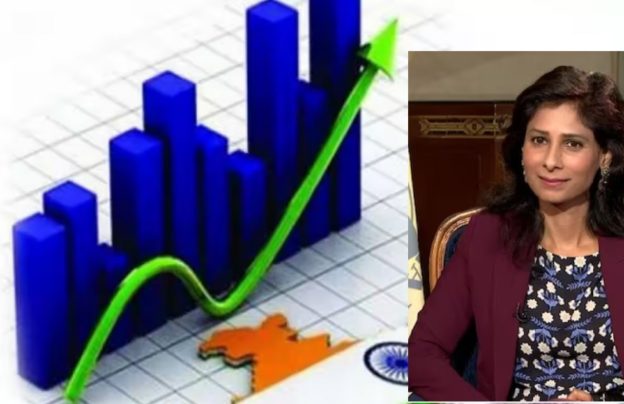India’s current contribution to global GDP is around 15 per cent, said Gita Gopinath, the first Deputy Managing Director of the International Monetary Fund in an exclusive interview with India Today.
Gita Gopinath, the first Deputy Managing Director of the International Monetary Fund, on Sunday said India’s contribution to global GDP is around 15 per cent. In an exclusive interview with India Today’s News Director Rahul Kanwal, the economist also said India will become the third-largest economy by 2027-28, based on current projections.
Calling India an “engine of global growth”, Gopinath, however, added that there is a lot more work that needs to be done.
“The more important thing is to maintain a high growth momentum for many more years in just the next four or five years. And that will require structural reforms. India is a large country, so in per capita terms, that will still be a small number even if we’re the third largest economy. So India needs to keep pushing on that front to keep the growth momentum going much more,” said the economist.
She added that the expected growth rate of the country for the current fiscal year is over six per cent. According to the economist, the two factors which are driving the growth are public investment and resilient consumption spending.
ON STRUCTURAL REFORMS
Gopinath stressed the need to attract private investment to increase the levels of per capita income and to get to continued high levels of growth. In order to enable an environment for private investment, it is imperative that the investment in public infrastructure continues, she added.
The economist said only four Indian states — Maharashtra, Karnataka, Gujarat and Delhi — get a large chunk of foreign direct investment and added, “A lot has to be done at the level of state governments.”
Other areas that need improvement, according to Gita Gopinath, include increasing the ease of conducting business, education and female labour force participation.
An area that India stands out when compared to other countries is digital infrastructure, said Gita Gopinath.
“I think India is really at the forefront in this area. It has already seen the benefits, not just in innovation but also on the fiscal front, in terms of much more efficient spending, the ability to collect revenues, formalising the economy,” she told India Today. She added that other countries are paying attention to what India is doing when it comes to digital infrastructure.
ON CHINA’S ECONOMY
When asked about the worries regarding China’s economy, Gita Gopinath said the country’s economy has slowed down but it has the resources to turn things around. “It still can do much more in terms of fiscal policy and in terms of monetary policy, and they are taking actions in that dimension. But these are things that can’t necessarily be turned around overnight,” she told India Today.
The economist added that China could still meet the target of 5 per cent growth that the government set. “But in the medium term, we have China’s growth projected at around 3.4 per cent. It’s not like we’re expecting to see a very deep downturn or a sharp recession, but just slowing growth,” added Gopinath.
ON INDIA’S G20 PRESIDENCY
Gita Gopinath also spoke on India’s G20 presidency and said it was a “huge deal” that a leaders declaration was adopted unanimously.
“Nobody expected that there would be a leader’s declaration. The fact that there was one is a huge deal. It tells you that even though countries can have different opinions about the way the world is headed, they can actually come together and have a declaration that I think is huge,” she added.
She also applauded the work done during India’s presidency on crypto regulation, debt issues and multilateral development bank financing.
Gopinath said it was a “landmark” that a debt restructuring was done for Zambia and said it was a “big deal” that all the private creditors agreed on a set for the African country.
REGULATION OF CRYPTO ASSETS
One of the main focus points during the G20 Summit was around the formation of globally enforceable regulations for crypto assets. Speaking on what decisions were taken during the Summit, Gita Gopinath said, “One of the big achievements of India’s G20 presidency was to bring together when it comes to crypto assets not just the regulatory aspect but also the macro financial consequences.
For the first time, they brought together the ‘Financial Stability Board’, who does regulation, and the IMF, who does macro financial stability.”
She said there was a clear consensus that crypto assets like Bitcoin cannot become legal currency as it would affect monetary sovereignty.
“The guidelines are to make sure that you have the issuers of such crypto assets licenced and registered,” she added. The economist added that every country at the Summit agreed on broad principles on regulating crypto assets despite knowing that there would be “country-specific circumstances”.
Speaking on the mechanism of the regulations, she said, “You’re going to be regulated in one way if it’s clear that you are effectively a speculative investment class. If you are being used for payments, then you’re going to be regulated as other payment systems are regulated.
It’s going to take some time to build up the specific details of it. But much more transparency, much more light is being shed on it and not the anything goes kind of environment.”





